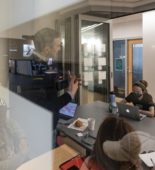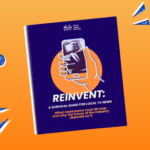People In This Story

Departments In This Story

Jeff Howe, Associate Professor in the School of Journalism, has recently been focused on mutual aid work, which has been at the center of the volunteer efforts happening in response the coronavirus pandemic. He helped start the Cambridge Mutual Aid Network (CMAN), which aims to provide a platform for volunteers to coordinate care for vulnerable populations affected by COVID-19 on a neighborhood basis (he wrote about this work in the Boston Globe Magazine). This aid work connects to – and was inspired by – the research he has been conducting on the broader topics of resiliency and problem-solving, which are also themes in his upcoming book.
Professor Howe is an affiliate in Northeastern’s Global Resilience Institute (GRI), where he has been able to collaborate with other experts, and focus his own research on specific facets of the much larger theme of resiliency. His immediate research explores how altruism has manifested in the rise of the field of public health, and specifically the discovery that diseases such as typhoid and cholera were spread through water supplies. His primary case study will be the career of William Budd, the 19th century doctor and epidemiologist known for recognizing that infectious diseases were contagious, but he also plans to explore two others: the effect of the opioid epidemic on parts of the United States and how Sarajevo, Bosnia has failed to recover from the Bosnian War, in large part due to a lack of resilience.
This research connects to resilience in a case much closer to home: the impact COVID-19 on his neighborhood of Cambridge, Massachusetts, particularly on elderly or otherwise vulnerable residents.
When the crisis hit, Professor Howe was focused on what he could do to help, utilizing Nextdoor, a hyperlocal social networking site, to connect with residents on aid efforts. He soon became aware of the Mutual Aid Medford and Somerville (MAMAS) network, another mutual aid network, founded by recent Tufts University graduates, that had formed out of the COVID-19 crisis. MAMAS had created a set of Google docs to help organize their volunteers – and had posted instructions on how other cities could easily duplicate what they had done. With these helpful guidelines, the Cambridge Mutual Aid Network started to take shape, and quickly grew to over 300 volunteers.
“We know that community resilience results in positive outcomes,” said Professor Howe. “Mutual aid is possible in resilient communities, growing from grassroots infrastructure versus top-down aid programs that tend to be traditionally slower and less effective in meeting the needs of those who need help the most. The mutual aid networks themselves are also incredibly resilient, and even after the pandemic ends, it will remain a network in waiting.”
Professor Howe’s work has attracted media attention; he has been interviewed by News@Northeastern, the Litmus Podcast, and EPIDEMIC hosted by CNN medical contributor, Dr. Celine Grounder, an infectious disease expert and medical journalist.




